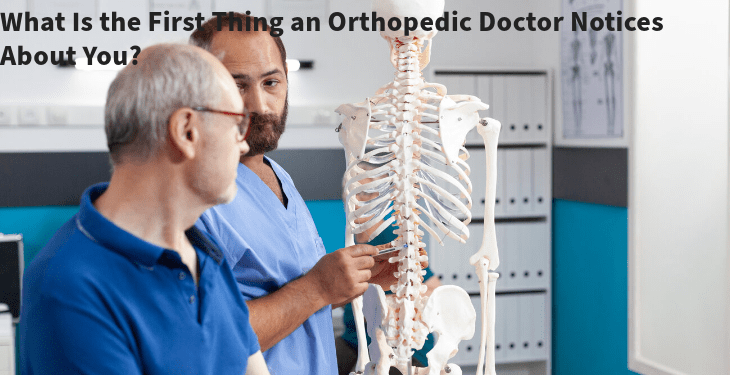What Is the First Thing an Orthopedic Doctor Notices About You?

If you are seeing an orthopedic doctor for the first time, you may be wondering what to expect. Orthopedic doctors specialize in the diagnosis and treatment of musculoskeletal disorders, which include conditions of the bones, joints, muscles, ligaments, and tendons.
During your appointment, the doctor will likely ask you a number of questions about your symptoms, medical history, and activities. They will also perform a physical exam, which will involve examining your joints, range of motion, and muscle strength.
The first thing an orthopedic doctor notices about you is likely your overall physical condition. They will look at your weight and muscle tone, as well as any visible signs of injury or deformity. They will also pay attention to your gait, or the way you walk.
After this initial assessment, the doctor will likely focus on the specific area of your body that is causing pain or discomfort. They may ask you to point to the area that hurts, and they will then palpate, or press on, the area to assess the level of pain and tenderness.
The doctor may also ask you to perform certain movements, such as bending or rotating your joints. This will help them assess your range of motion and identify any areas of weakness or instability.
In some cases, the doctor may order imaging tests such as X-rays, MRIs, or CT scans. These tests can help provide a more detailed view of your bones, joints, and soft tissues.
What to Expect During Your Orthopedic Exam
Here is a more detailed overview of what to expect during your orthopedic exam:
- The doctor will ask you a number of questions about your symptoms, medical history, and activities. They will want to know how long you have been experiencing pain, what activities make it worse, and if you have any other medical conditions.
- The doctor will perform a physical exam, which will involve examining your joints, range of motion, and muscle strength. They will also pay attention to your gait, or the way you walk.
- The doctor may ask you to point to the area that hurts, and they will then palpate, or press on, the area to assess the level of pain and tenderness.
- The doctor may also ask you to perform certain movements, such as bending or rotating your joints. This will help them assess your range of motion and identify any areas of weakness or instability.
- In some cases, the doctor may order imaging tests such as X-rays, MRIs, or CT scans. These tests can help provide a more detailed view of your bones, joints, and soft tissues.
After the Exam
After the exam, the doctor will discuss their findings with you and explain their diagnosis. They will also discuss your treatment options, which may include medication, physical therapy, or surgery.
It is important to be an active participant in your care, so be sure to ask the doctor any questions you have about your condition or treatment plan.
Conclusion
An orthopedic exam can be a valuable tool for diagnosing and treating musculoskeletal disorders. By being prepared for the exam and asking questions, you can help ensure that you get the best possible care.
Additional Tips
- Dress in comfortable clothing that allows you to move freely.
- Bring a list of your medications and any other relevant medical information.
- Write down any questions you have for the doctor.
- Be prepared to answer questions about your symptoms, medical history, and activities.
- Be an active participant in your care and ask the doctor any questions you have.
The orthopedic examination can be a bit uncomfortable, but it is important to remember that it is necessary to get an accurate diagnosis. By following these tips, you can help make the process as smooth as possible.








